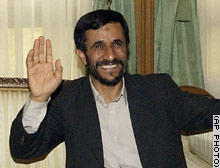All Eyes on ThaboThabo Mbeki flies back into the country today, a man scrutinised as never been before during his presidency. This decision will be a yard-stick of his political leadership, and will be a crucial test of the character of the man.
The pressure is squarely on his shoulders; facing an expectant nation with one side wanting to see him support a fellow resistance leader, and the other wanting him to show the world that this South Africa government defies corruption. The G8 is waiting in the wings, with Bush's future Aid, and much of Mbeki's NEPAD, reliant on Africa's willingness to rid its governments of corruption. A softening on Zuma will surely have a marked effect on these discussions.
With Mbeki being a second term president, and one concerned with his legacy, the prudent response would be to follow an NPA announcement of charges being brought with a request for Zuma's resignation 'until the end of the trial', by which time Zuma will most likely be damaged beyond repair. Should Zuma refuse to resign, as has been inferred, then Mbeki would have to take the courageous step of relieving him of his duties as Vice-President.
This would naturally fly in the face of Zuma support from within the ANC and Tripartate Alliance, with the party lines already extremely blurred at present, but this may well be a risk Mbeki is willing to take. The ANCYL, along with other supporters, has already hedged their bets on their support of Zuma by calling for him to have the 'opportunity' to face trial. Much of Zuma's support comes from ANC back-benchers and factions of the ANC rank-and-file membership, who believe that this has from the outset been a political feud. However, Mbeki may believe that these members may be swayed by his tough leadership, perhaps relying on other high profile ANC members to bring these segments into the party line.
It will also give Mbeki a defendable reason to shake up his cabinet, something he has been interested in pursuing since his reelection, and clears the way for his partial successors, not least of which is Nkosazana Dlamini-Zuma.
In my view, Thabo Mbeki has been a man never slow to take on his opponents, and I think that he will face this political watershed by ridding himself of Zuma from both his cabinet, and the vice-presidency.






